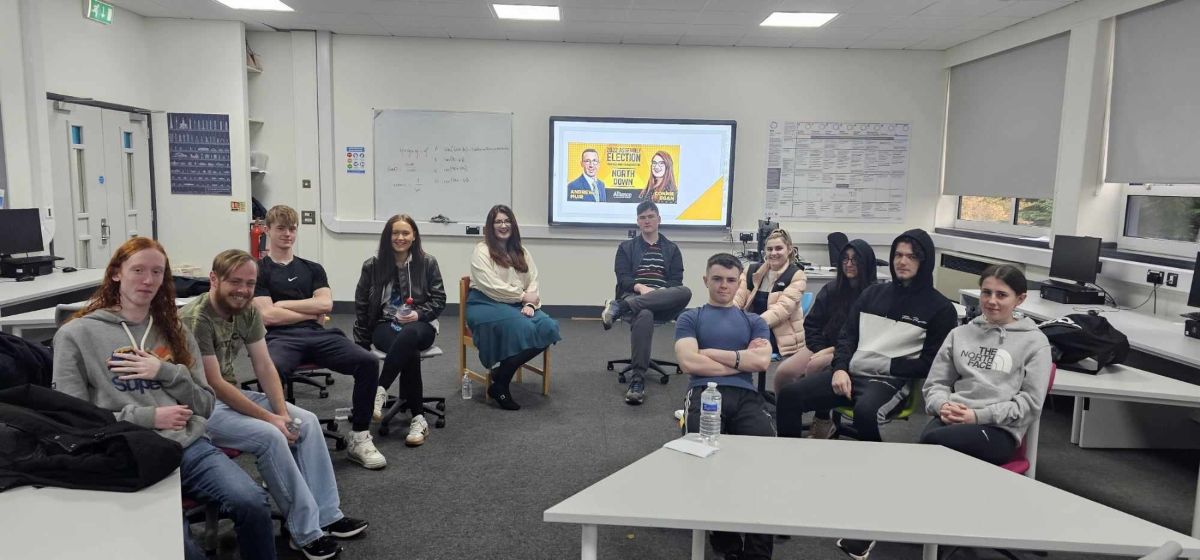Foundation Degree in Cyber Security and Digital Forensics (Validated by The Open University)
The Foundation Degree (FD) in Cyber Security and Digital Forensics is aimed at meeting the local demand of Cyber Security experts in Northern Ireland. It will cover a range of computing specialisms allowing successful students to follow different career paths.
Available Sessions
We have 3 sessions available for application on this course in Lisburn, Downpatrick, Bangor.
The Foundation Degree consists of 60 credits (normally 3 modules) per semester in Year 1 and Year 2. The Foundation Degree provides you with an opportunity to undertake a structured work- based learning placement within the computing industry during the final year of the programme. It is the responsibility of the student to obtain a suitable work placement employer; however, assistance will be provided by the college as required.
This programme is based on a hybrid learning model with a focus on face-to-face delivery.
Modules include:
Year 1 Modules (Level 4)
- Computational Mathematics: Learn mathematical principles to support the development of software.
- Computer Systems: Develop skills to build, maintain and troubleshoot hardware and software.
- Programming Fundamentals: Learn how to design and implement algorithms using industry relevant IDE’s and languages.
- Incident Response: Learn how to respond to security alerts and threats.
- Web Technologies and Applications: Be able to develop and test a web application.
- Network Infrastructure: Develop skills to help you install, operate and troubleshoot networks.
Year 2 Modules (Level 5)
- Cloud Security: Learn the security threats with cloud computing and to protect against these threats.
- Network Security: Develop the skills needed to protect computer networks.
- IoT Security: Develop the skills required to identify security flaws in IoT systems and how to protect against them.
- Innovative Delivery of Mobile Applications: Learn to design and develop mobile applications.
- Work-based Learning: This work placement enables students to apply their learning within the workplace.
As the matrix of the digital world continues to unravel, the demand for skilled IT professionals is skyrocketing. From the mundane to the extraordinary, computer systems permeate every aspect of our lives, shaping our reality.
This course will serve as your digital passport, granting you access to a vast array of IT topics and industries. Explore the depths of the digital abyss, uncover hidden vulnerabilities, and become a master of the machine. Computing is a global language, spoken by innovators and visionaries around the world.
General Entry Requirements
The general entry requirements below identify the minimum qualifications needed to apply for the programme. Other qualifications will be considered on an individual basis on application. You are required to upload a copy of your qualification certificates to show how you meet the entry requirements for the programme prior to enrolment. Applications will also require successful completion of the admissions process.
GCSE/ Level 2 Requirements
- GCSE grade C/4 in English Language, or Level 2 Certificate in Essential Skills Communication, or equivalent in an approved alternative qualification.
AND - GCSE grade C/4 in Mathematics, or Level 2 Certificate in Essential Skills Application of Number, or equivalent in an approved alternative qualification.
AND - passes in 4 different subjects (can include English Language and Mathematics and as above) and 2 at GCSE level (grades A*-C*/9-4), or equivalent in an approved alternative qualification.
Course Entry Requirements
UCAS
A minimum of 64 UCAS Tariff points including:
- GCE A level (A2): Typical grade profile CC
OR - [RQF] Pearson BTEC Level 3 Extended Diploma with overall award profile MPP
OR - Access to HE Diploma (NI): 45% overall
OR - An equivalent in an approved alternative qualification
Accreditation of Prior Learning
Alternatively, you can provide evidence of your ability to undertake the programme by meeting the requirements for the Accreditation of Prior Learning (APL) process, either through Accredited Prior Certificated Learning (APCL) or Accredited Prior Experiential Learning (APEL). Further details on APL can be found in the HE Admissions Process section of our website and the HE Accreditation of Prior Learning SOP.
International Students English Language Requirements
International applicants, from Non-Native English speaking countries, must have evidence of English Language Level B2 on the Common European Framework of Reference for Languages:
- IELTS 6.0 (Academic) (minimum of 5.5 in all skills)
- PTE Academic 51 (minimum of 46 in each part)
- Or equivalent UKVI-approved English Language Test
For further information please contact our International Department at international@serc.ac.uk
The course provides the opportunity to undertake a placement within the computing industry to assist you in developing real-life experience and practical skills that employers want.
You will learn transferable skills such as communication, organisational skills, problem solving and critical thinking which will help you to apply for relevant jobs within the computing industry. The programme is designed to facilitate your development of a range of graduate qualities that are highly valued in the workplace.
Available Sessions
We have 3 sessions available for application on this course in Lisburn, Downpatrick, Bangor.
Enquiries Information
For more information or help with this course send us an enquiry and a member of our team will get back in touch.

UCAS Information
You can apply directly to SERC for this course using the Apply Now buttons.
If you apply directly to SERC we will process a UCAS application on your behalf in accordance with the Data Protection Act 2018/ UK GDPR.
Applications to our full-time undergraduate Higher Education courses can also be made through UCAS.
View SERC on UCASAvailable Sessions
| Title | Campus | Start | Spaces | Fee | Apply or get more information | |
|---|---|---|---|---|---|---|
|
Foundation Degree in Cyber Security and Digital Forensics (Validated by The Open University)
Y11001BF1A-25/26-FT
|
Bangor
|
01/09/2025
|
18 | £2940.00 |
|
|
|
Foundation Degree in Cyber Security and Digital Forensics (Validated by The Open University)
Y11001DF1A-25/26-FT
|
Downpatrick
|
01/09/2025
|
20+ | £2940.00 |
|
|
|
Foundation Degree in Cyber Security and Digital Forensics (Validated by The Open University)
Y11001LF1A-25/26-FT
|
Lisburn
|
01/09/2025
|
20+ | £2940.00 |
|
|
Please select a campus from the list above to view the available sessions. |
||||||
Customer Enquiries
Need more information or have a question about this course? Send us a message below and we will get in touch.
Start New EnquiryTerms & Conditions
Students will be required to comply with SERC's Terms & Conditions of study.
We strive to ensure the description of courses on SERC's website and in publications is accurate. However, for various reasons there may be occasions when the College may need to change arrangements or be unable to deliver classes due to circumstances such as reduced funding. If there are insufficient numbers applying for a course it may not be viable to deliver the class.
Courses are continually reviewed to take advantage of new teaching approaches and developments in research, industry and the professions. Please be aware that modules may change for your year of entry. The exact modules available and their order may vary depending on course updates, staff availability, timetabling and student demand. Please contact the course team for the most up to date module list.

Higher Education
If you have just completed your A-Levels, Higher Education is most likely the option for you. HE usually covers HNC, HND & Foundation Degree level of courses including our Higher Level Apprenticeships.
Explore Higher EducationLatest Events
Stay connected to SERC: Your guide to upcoming college events!





